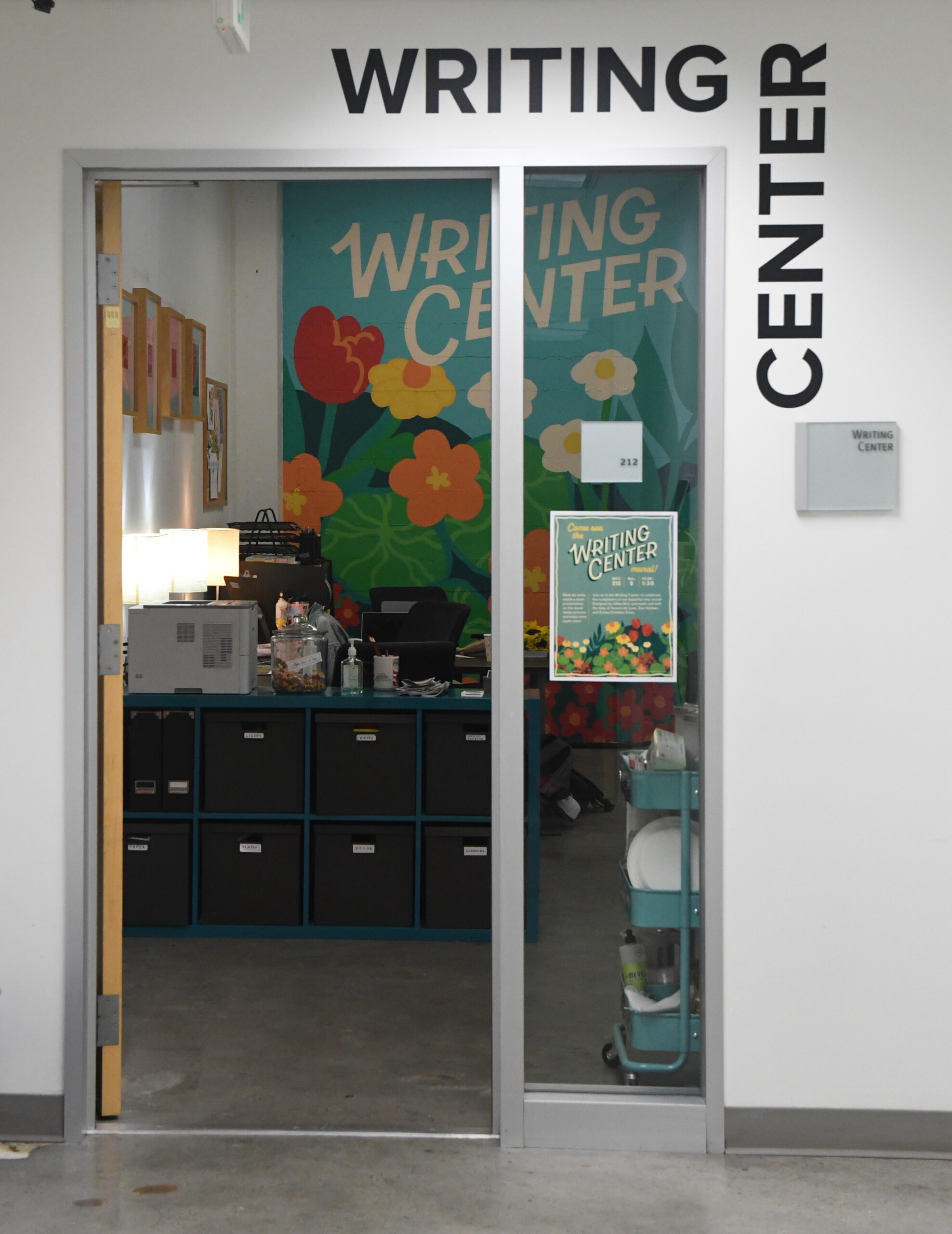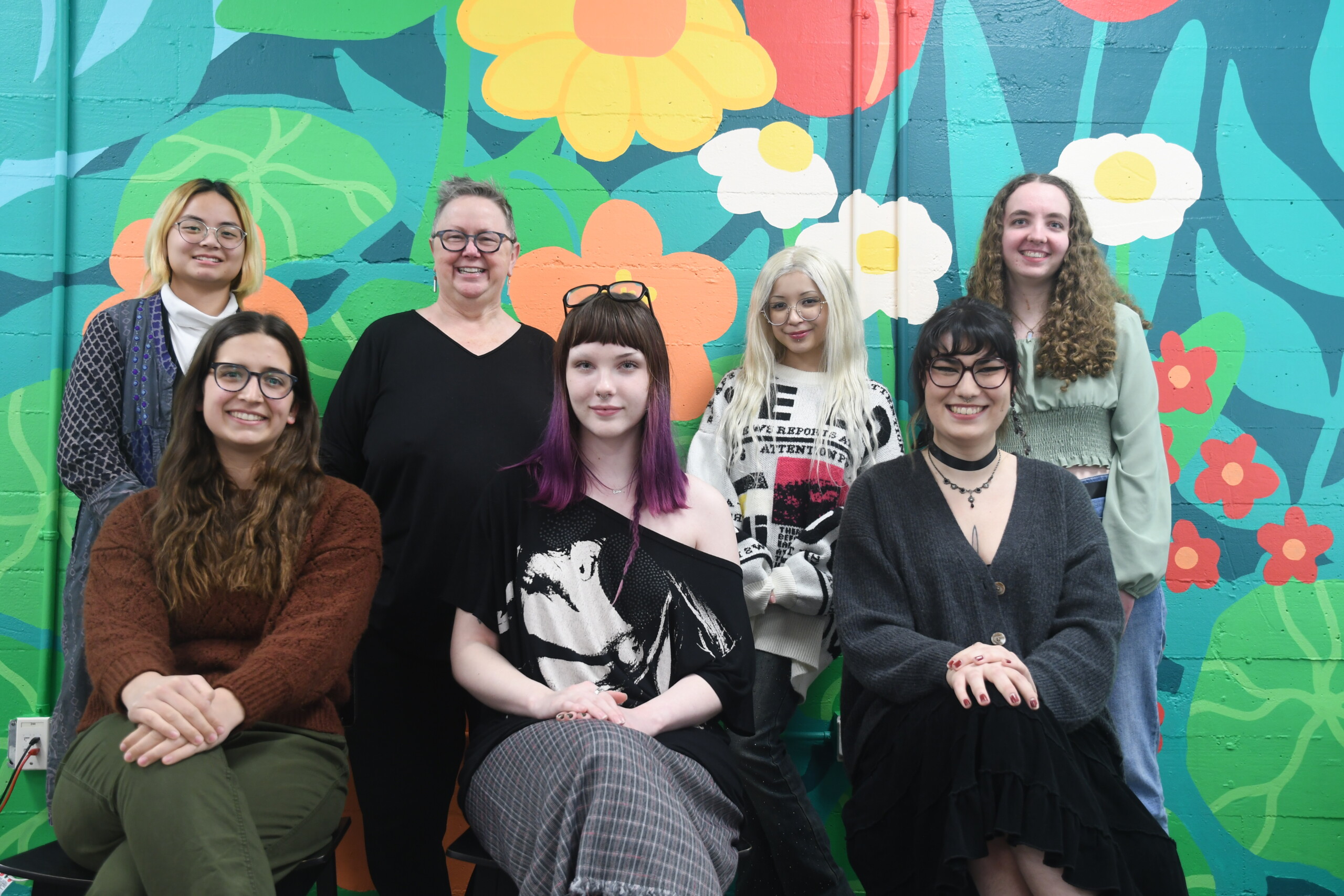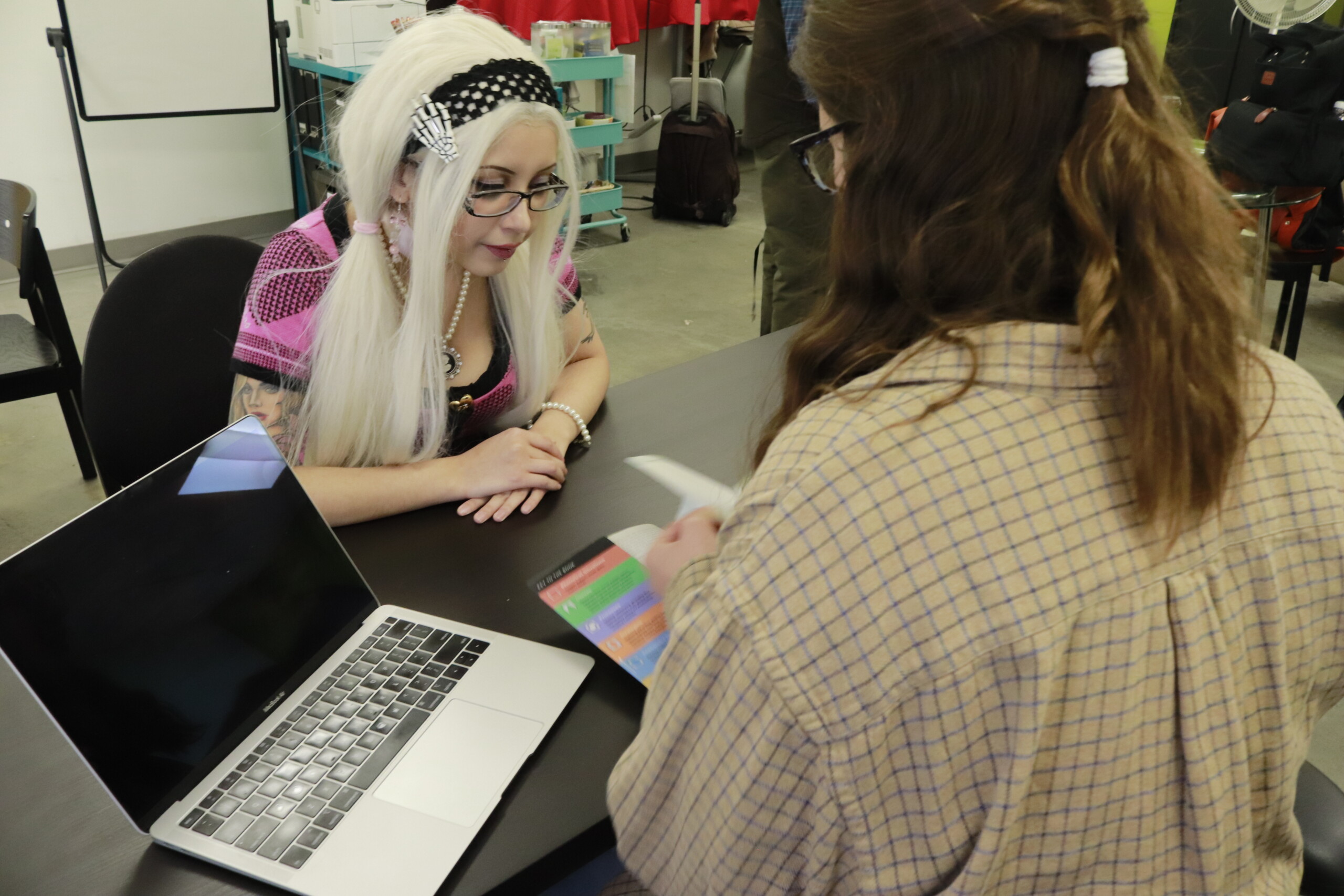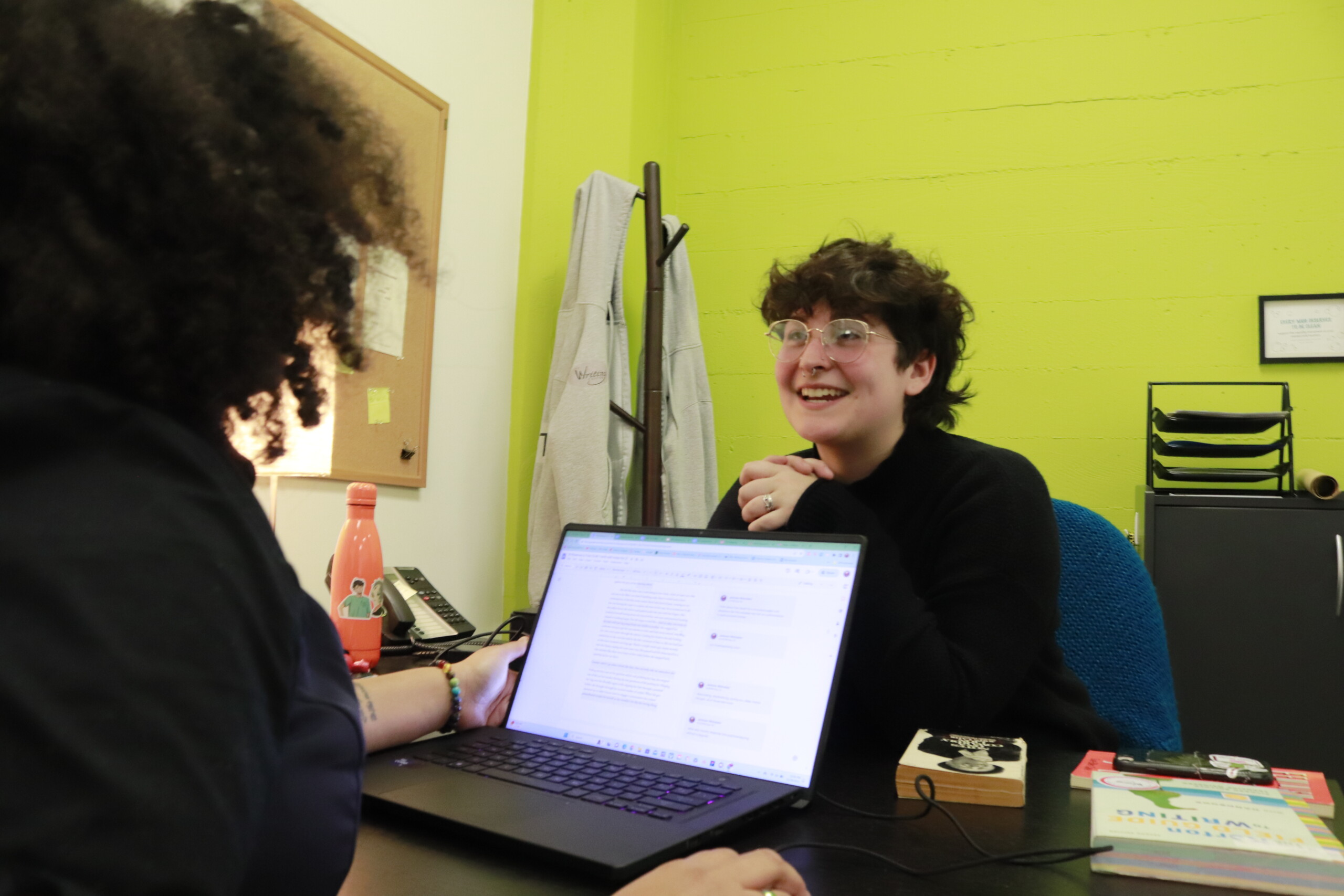Writing Center
Writing Center Hours:
Monday through Thursday, 10:00 AM – 6:00 PM
Friday, 10:00 AM – 4:00 PM
How to Schedule a Consultation:
The Writing Center offers individualized half-hour face-to-face conferences and screencast feedback.
- You may schedule your consultation (MCC 212) by clicking on this link. Same-day appointments are welcome.
- You may submit your writing for remote feedback seven days a week. Expect a response within 48 hours.
- Or, just drop in to the Writing Center (MCC 212). If a consultant is available, they’ll be happy to help you.
What’s the Writing Center for?
The Writing Center provides personalized, one-on-one support on any kind of writing at any stage of the process, from brainstorming to drafting, revision to polishing. Bring in your writing projects, your questions, your ideas, and your readiness to collaborate!
Here are a few reasons to use the Writing Center:
- Build your skills as a writer
- Become confident with all stages of the writing process
- Develop your unique style, strengths, and skills
- Write more effectively for diverse readers
- Share your voice as an artist
- Prepare for writing you’ll do after college
In all types of our consultations, you can expect that we will:
- Set our agenda together–what we focus on is up to you
- Support and enrich your process
- Develop strategies you can use later
- Build skills and confidence
FAQ
What is the Writing Center for?
The Writing Center provides personalized, one-on-one support on any kind of writing at any stage of the process, from brainstorming to drafting, revision to polishing. Bring in your writing projects, your questions, your ideas, and your readiness to collaborate! We offer two kinds of consultations: in-person in the Writing Center (MCC 212) and remote feedback where you’ll receive a video and comments from a consultant within 48 hours after submitting.
What can I work on in a Writing Center consultation?
Any kind of writing at any stage of the process! Here are some of the kinds of writing, topics, and questions we work on in consultations:
- Essays
- Speeches
- Presentations
- Copy for design projects
- Artist statements & bios
- Senior thesis
- Letters
- Scholarship materials
- Resumes
- Scripts
- Poetry
- Short stories
- Understanding an assignment
- Brainstorming & generative strategies
- Organization and flow
- How do I maintain my voice in my writing?
- Resumes & cover letters
- Developing a thesis statement
- Introductions & conclusions
- Word choice
- Syntax/sentence structures
- Grammar conventions & choices
- Are my ideas making sense?
- Is this argument convincing?
- Citing sources
- And much more!
How do I schedule an appointment?
Click on this link and find a day and time that work for you.
Can I just drop in?
Yes! While it’s preferred that you make an appointment, you can stop by anytime we’re open. Just check with the staff to see if they’re available. And you can feel free to work in the Writing Center even when you don’t have a consultation. We’re located in MCC 212, and there is a sofa and chairs, as well as desks and tables where you can work quietly.
What should I expect from a consultation? How should I prepare for my consultation?
We always start with your questions, problems to solve, or ideas. Your peer consultant will begin by clarifying your goals for the consultation and together you’ll develop a plan for how to spend your time.
Your consultant will ask you to share your writing. Print your document if you’d like to work on a physical copy of the paper, or be prepared to share a digital version.
Consultants will ask lots of questions to help them provide relevant feedback, observations, and suggestions. Together, you may read all or part of your writing aloud and make comments and revisions on the document while you talk. Your consultant may provide other resources to help you out with a task, or suggest spending some of the consulting time applying a writing strategy.
Typically, we focus on broader questions about things such as ideas, clarity, and organization (higher-order concerns or HOCs), before attending to patterns of sentence structure or grammar (later-order concerns or LOCs).
There are two key things you can do to prepare for your consultation: think about your goal or reason for having the consultation (filling out the form will walk you through this!). By thinking ahead about what you want to accomplish in the consultation, we can jump right into the conversation together with a clear focus. Have handy anything you’re using in writing (the assignment, course texts, research sources, etc.) to help us understand the assignment so we can use the time efficiently.
What should I expect from remote feedback? How do I submit my writing for remote feedback?
A Writing Center peer consultant will read your draft and provide comments, questions, and suggestions based on your request. In most cases, we will respond with written feedback, but you may request a screencast, if you prefer. A screencast is a video of our computer screen with audio narration. Screencasts are usually 5-8 minutes in length. You can pause, rewind, or review these videos as many times as you like.
To submit your writing for remote response, click on this link and follow the instructions to complete the form and upload your writing. The more information you provide, the more personalized we can make your feedback. We’ll send our response to your Cornish email account within 48 hours.
How frequently may I use the Writing Center?
Writers may reserve up to 2 consecutive 30-minute slots for a total of 60 minutes of consultation and as many as 3 appointments per week.
Can alumni use the Writing Center?
Cornish alumni are welcome to use Writing Center services after graduation. They may use our synchronous consultations by scheduling an appointment or submit online using their Cornish email. We just ask that alumni users respect the volume of current student consultations we conduct by doing two things:
- Be mindful about the frequency with which you seek feedback, especially during midterm and finals week.
- Be aware that during busy times of the semester we need to prioritize currently enrolled students. This means it may take us longer than 48 hours to get back to you with video feedback, or we may need to find an alternative time to meet with you. We’ll let you know if that’s the case.
How can I become a Writing Center Peer Consultant?
Hiring generally happens in the Spring semester for the Fall of the coming year. Look for notice in the Cornish student newsletter. 2nd, 3rd, and 4th year students are eligible to apply. It’s one of our goals to maintain a richly diverse staff that represents the identities of our community, so students of all majors, multilingual speakers, and people from all educational backgrounds are encouraged to apply.
Mission & Values
MISSION
We believe that writing is a means to think through and communicate about art, and an art-form unto itself. By using collaborative, question-based, and writer-centered approaches, we support students of all backgrounds and abilities as they develop into more effective, confident writers.
VALUES
- The Writing Center is for everyone
- Anyone who writes anything is a writer
- All writers, no matter how accomplished, can improve their writing
- All artists write
- The Writing Center supports writing as a means of creating and sharing ideas
- The Writing Center is a place for collaboration, a particularly effective mode of learning
Anti-Racist Beliefs and Practices
ANTI-RACIST BELIEFS
The Cornish Writing Center is committed to embedding anti-racist practices and learning from anti-racist scholarship at all levels of our operations as a student support service. We recognize that racism is real and that systemic oppression must be addressed at all levels and locations within higher education. In particular, we believe that students have the right to use and celebrate their own languages within educational contexts. We acknowledge that what is often considered “good” writing, especially in academic contexts, has its roots in the rhetoric and grammar of white, affluent, heteronormative systems. Writing and language are powerful, if sometimes subtle, avenues through which racism infuses our educational systems. Given this, we approach all writing tasks as opportunities for writers to make rhetorical choices and to negotiate the power and identity questions at play in each writing situation. We take seriously our role in engaging student writers in critical analysis of the writing situations they encounter and the impact of their writing choices given their individual identities.
ANTI-RACIST PRACTICES
To put these beliefs into practice, we implement the following practices in the Writing Center:
- All students hired as Peer Consultants are given training in antiracist pedagogy as it pertains to writing and peer-to-peer learning
- We directly engage oppressive language and micro-aggressions when written or voiced, whether by staff or writers
- In our training and our consulting practices, we decenter Standard Edited American English and academic writing as a the standard for all “good” writing by emphasizing writers’ choices and sharing the raced and privileged nature of standards of “good writing”
- We celebrate the linguistic diversity of writers by supporting their use of their home languages and multiple Englishes as a legitimate writing choices
- We frame writing as an act of rhetorical choice and invite writers to wrestle with questions of code-meshing, code-switching, identity and privilege as they manifest in writing
- We center and learn from the writing, scholarship, and art of BIPOC in our training materials and on our social media platforms
- As a staff, we continually evaluate our practices and the services we offer through various measures including user demographics and feedback to ensure our accessibility to writers of all identities
- We will continue and improve our hiring practices to ensure we recruit students who represent the demographics and experiences of the Cornish student community
- We will support department-level anti-racist work through dialogue, partnerships, and in-class workshops
- We ensure all resources we share and create are in alignment with these beliefs and practices
Resources
The Writing Process
The Writing Process is a cycle of activities that includes generating ideas, drafting, revising, and polishing your work. It is a recursive process, meaning that at any one stage along the way, you may find that you have to return to previous steps. The writing process is not linear and it’s different for everyone, but it tends to follow a general, overall pattern, even if it looks more like a spiral than a straight line.
BRAINSTORMING AND GENERATING IDEAS
Generating Ideas with lots of different strategies to try!
Getting Started: Interpreting Writing Assignments from your Courses
ORGANIZING
Sentences: Simple, Compound, and Complex (video & transcript)
Developing Strategic Transitions with lots of great techniques to try!
Reverse Outlines: A Writer’s Technique for Examining Organization
DRAFTING AND REVISING
Thesis vs Purpose Statements
Developing a Thesis Statement
Writing and Revising Academic Projects
Revising, prioritizing revisions, and a revision checklist
POLISHING AND PROOFREADING
How to Proofread Your Paper
Editing for Grammar and Punctuation
All dialects of English have grammatical patterns and rules. When we hear folks talk about using “proper grammar” they’re usually referring to Standard Edited American English. Conforming to Standard Edited American English (SEAE) is generally expected in academic and professional contexts, but that does not make it the only way to structure ideas in sentences. It is merely one way, and the way that’s privileged in American culture. As you write in college and in your field of art-making, you’ll find places where conforming to SEAE is more valued, and places where you can switch between dialects and speaking and writing patterns more fluidly.
In the Writing Center, our goal is not to force you to conform to any one standard, but to support you in making informed decisions about the grammar, syntax, and style you want to use in the context you are writing. We want to help you expand your knowledge and repertoire as a writer, including in your comfort with the systems of SEAE. What you’ll find below are resources about grammar, punctuation, syntax, and editing.
CONVENTIONS IN STANDARD EDITED AMERICAN ENGLISH (SEAE)
Capitalization (video + transcript)
Hyphens and Dashes (video & transcript)
Semi-colons and Colons (video & transcript)
Subject-verb Agreement
Tense Shifts (video & transcript)
Pronouns (video & transcript)
Using Gender Neutral Pronouns in Academic Writing
EDITING FOR COMMON ERRORS
Inclusive Language
Inclusive and Antiracist Writing Guide includes information on how to write inclusively on topics like ableism, disability, mental health, and neurodiversity; gender identity and sexual orientation; as well as a guide to antiracist writing about People of Color, Black People, and/or Indigenous People, with links to additional resources for each topic.
The Radical Copyeditor is a great resource for learning to be conscious of how the language we use impacts others, it covers a wide range of topics such as race, disability, gender, sexuality, class, immigration, religion, and more. “Words matter. Language can perpetuate oppression or support liberation.” – Alex Kapitan, author of The Radical Copyeditor.
The Conscious Style Guide provides links to various resources on how to include, empower, and respect the people around you in your writing
Citation, Style Guides, and Tips
Citing sources in your writing is important in academic writing. It helps you show your reader how you developed your ideas and builds your credibility as a writer. But citing sources is common in many forms of writing–think of all the hyperlinks you see on the internet! Need to know how to cite something and we don’t have a relevant resource here? Cornish librarians are a great help!
STYLE GUIDES
Your instructors may ask you to use a specific citation style in your work. The most common are MLA, APA, and Chicago. Use the links below to learn about how to cite in each style.
APA Style Guide from Purdue Online Writing Center
MLA Style Guide from Purdue Online Writing Center
Chicago Style Guide from Purdue Online Writing Center
CITING SOURCES IN YOUR WRITING
TIPS
EasyBib and Zotero are online resources that can help you help you track and cite your sources. Ask the Cornish librarians for a tutorial.
Creative Writing
WRITING PROMPTS
Creative Writing Now: Writing Prompts for Poetry
The Time is Now: Weekly Writing Prompts
INSPIRATION AND SUPPORT
How to Stay Inspired as a Writer
Creative Nonfiction: True Stories, Well Told
Poets.org “Without poetry, we lose our way,” Joy Harjo
The Marginalian (formerly Brainpickings)
How to Develop a Consistent Writing Habit podcast
ADVICE FROM ESTABLISHED WRITERS
Ten Rules for Writing Fiction from Elmore Leonard, Margaret Atwood, Roddy Doyle, and more
I Talked to 150 Writers and Here’s the Best Advice They Had from Khaled Hosseini, Jane Smiley, Neil Gaiman, and more
FORMATTING
PROFESSIONAL ASSOCIATIONS
Critique, Feedback, and Peer Response
At a certain point in the writing process, it’s useful to invite feedback in order to learn how your work lands on a reader, what is strong or resonant, and what might need further development. The resources here will provide you with tools to engage in a feedback process that is useful to you, that centers your needs, and that respects your goals.
Liz Lerman’s Critical Response Process is the gold standard, frequently employed in the world of dance and gaining use and credibility in other fields as well. (You might also seek out Lerman’s book.)
Peter Elbow’s Ways of Responding provides a variety of approaches to giving and receiving feedback through peer response. (You might also seek out Elbow’s book.)
Professional Writing
The resources below offer tips and strategies for writing in professional genres. There’s lots of information on the internet about this type of writing, so we’ve curated these lists with an eye to clear, concise material and relevance to general job hunting and practicing artists alike. When applying for positions within your area of speciality, it’s always wise to speak with an instructor or mentor to learn about practices, expectations, and conventions specific to that field.
RESUMES
Resume Basics Brief guide on what to include, options for organization, and a visual example.
Resume Writing Tips Explore this page and its links to learn about different types of resumes, using active verbs, and more.
COVER LETTERS
Cover Letter Basics Includes an overview, formatting tips, and a visual template.
Writing Cover Letters Includes strategies for customizing letters for employers, and tools for generating content.
“Dear Recent College Grads, Here’s How to Write a Great Cover Letter” Seven pieces of advice explored in depth using examples.
CURRICULUM VITAE (CVs)
Writing an Artist’s CV Describes the difference between CVs and resumes and offer strategies and resources.
How to Write an Artist’s CV in 10 Steps Practical advice for visual artists specifically.
CV Writing Tips A thorough guide comparing resumes and CVs, detailing the contents of each CV category, and offering tips for first time CV writers.
ARTIST STATEMENTS
Artist Statement: How Do I Write Successfully About My Art Practice? Plenty of ideas for brainstorming great content and revising once you have something on the page.
The Artist Statement: Breaking the Blank Page General tips and generative questions to get you started.
Overview with examples from Dance, Design, Theater, Film, and Music Check out this resources to see how different fields approach this genre.
The Artist Statement: 5 Dos and Don’ts Tips from people who read thousands of artist statements in a year.
Anti-Racist Writing Resources
GENERAL RESOURCES
Cornish Library Anti-Racist Resource Guide
Principles of Anti-Racist and Inclusive Writing
FOR STUDENTS
Conducting Research Through an Anti-Racism Lens
FOR TEACHERS
How to Stop Harming Students: An Ecological Guide To Anti-Racist Writing Assessments
DeColonizing Your Syllabus? You Might Have Missed Some Steps
Recommended Reading About Writing
Whether you’re new to writing or a seasoned veteran, you can benefit from reading the books listed here. These books include everything from advice on getting started to grammar rules, writers’ personal stories, and wisdom gained from living the writer’s life. No matter your writing genre, you’ll find something here to guide or inspire you. Most are available in the Cornish Library.
Bird by Bird: Some Advice on Writing and Life by Anne Lamott – “Paragraph by paragraph, this humorous, insightful, no-nonsense approach will remind novices why they are writing: to tell the truth, to live from the heart, and to share their gift with others. A writer’s guide that is bound to teach and inspire by example.” Kirkus Reviews
Writing Down the Bones: Freeing the Writer Within by Natalie Goldberg – “The secret of creativity, Natalie Goldberg makes clear, is to subtract rules for writing, not add them. It’s a process of ‘uneducation’ rather than education. Proof that she knows what she’s talking about is abundant in her own sentences. They flow with speed and grace and accuracy and simplicity. It looks easy to a reader, but writers know it is the hardest writing of all.”—Robert Pirsig, author of Zen and the Art of Motorcycle Maintenance
Writing With Power: Techniques for Mastering the Writing Process by Peter Elbow – “Page after page, chapter after chapter, Peter Elbow gives direct and down-to-earth advice for beginning writers.”―Teachers and Writers
The War of Art: Break Through Your Blocks and Win Your Inner Creative Battles by Steven Pressfield – “A vital gem…A kick in the ass for all of us with a tendency towards procrastination.”
The Elements of Style by William Strunk Jr. and E.B. White – “…a marvelous and timeless little book… Here, succinctly, elegantly and without fuss are the essentials of writing clear, correct English.”–John Clare, The Telegraph
On Writing Well: The Classic Guide to Writing Nonfiction by William Zinsser – “Not since The Elements of Style has there been a guide to writing as well presented and readable as this one. A love and respect for the language is evident on every page.” — Library Journal
The Deluxe Transitive Vampire: The Ultimate Handbook of Grammar for the Innocent, the Eager, and the Doomed by Karen Elizabeth Gordon – “Playful and practical, this is the style book you can’t wait to use, a guide that addresses classic questions of English usage with wit and the blackest of humor.”
Writing for the Design Mind by Natalia Ilyin – “I would make this book required reading for any writing intensive course within an Art & Design department.” ―Gary Rozanc, University of Maryland, Baltimore County, USA
The Writer’s Journey: Mythic Structure for Writers by Christopher Vogler – “Originally an influential memo Vogler wrote for Walt Disney Animation executives regarding The Lion King, The Writer’s Journey details a twelve-stage, myth-inspired method that has galvanized Hollywood’s treatment of cinematic storytelling.”
The Anti-Racist Writing Workshop: How to Decolonize the Creative Classroom by Felicia Rose Chavez – “With personal anecdotes and memories, with brilliant readings of spaces, classrooms, and texts, Felicia Rose Chavez communicates so much of what is truly at stake in the classroom: our voices, our histories, and our capacities to live ethically, curiously, and in true and deep connection with ourselves and others. This book is a gorgeous dismantling just as it is an urgent offering up of strategies and questions. My heart is so alive reading this.”—Aracelis Girmay, author of The Black Maria
Craft in the Real World: Rethinking Fiction Writing and Workshopping by Matthew Salesses – “A real eye opener . . . It unpacks the seemingly ‘universal’ lessons we learn about what makes fiction good to reveal how whiteness and maleness have shaped those values.” —Kumari Devarajan, Code Switch, NPR
The Art & Craft of Playwriting by Jeffrey Hatcher -“Jeffrey Hatcher knows the nuts and bolts of writing for the theater. Here, he shares his views on it all–from building tension and plotting a scene, right down to moving a character from one side of the stage to the other. From crafting an intriguing beginning to delivering a satisfying ending.”
Story : Substance, Structure, Style and the Principles of Screenwriting by Robert McKee – “No one better understands how all the elements of a screenplay fit together, and no one is better qualified to explain the “magic” of story construction and the relationship between structure and character than Robert McKee.”
The Making of a Story by Alice LaPlante – “The Making of a Story is a fresh and inspiring guide to the basics of creative writing―both fiction and creative nonfiction. Its hands-on, completely accessible approach walks writers through each stage of the creative process, from the initial triggering idea to the revision of the final manuscript.”
Writing Fiction: A Guide to Narrative Craft by Janet Burroway – “Scrupulously written by a first-rate novelist who . . . gives tips, offers sensitive commentary, and exceptions to what may pass for ‘rules’ in writing.”― Frederick Busch, Los Angeles Times
The Ode Less Traveled: Unlocking the Poet Within by Stephen Fry – “A smart, comprehensive guide to prosody. … The key to the book’s success is its tone, which is joking, occasionally fussy, sometimes distractingly cute, but always approachable. This book works because it gives us a strong perspective without sounding pinched or dogmatic.”–David Orr, The New York Times Book Review
Instructor Resources
Teaching Guides
Teaching Guides from the Writing Across the Curriculum Clearinghouse are “designed for writing teachers and for teachers of other subjects who want to use writing and speaking activities in their classrooms.” Topics include things like designing writing assignments, using student peer review, helping students generate a topic.
Faculty Tip Sheets
Faculty Tip Sheets Topics include how to manage grammar, managing paper loads, encouraging students to revise, and sequencing writing assignments.
Responding to Student Writing
Responding to Student Writing Provides strategies for effective response to student writing.





